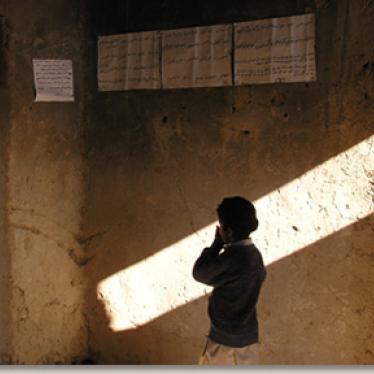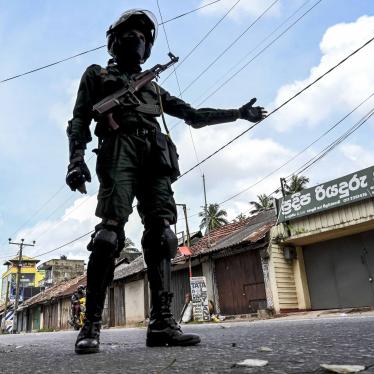The deteriorating human rights situation throughout Afghanistan warrants immediate attention and action by the United Nations. Human Rights Watch believes the Security Council’s upcoming fact-finding mission to Afghanistan can help improve conditions by demonstrating the United Nation’s ongoing commitment to the well-being of all Afghans.
2006 has been the bloodiest year for Afghans since the United States and its allies helped oust the Taliban from power. Southern Afghanistan has degenerated into open warfare, placing Afghan civilians at risk of direct injury, both by insurgent forces, and, tragically, the international forces supposed to be protecting Afghans. This fighting has halted much needed development activity and has reversed some of the modest gains made in the Taliban’s absence, such as returning children, particularly girls, to school.
But the declining human rights situation is not confined to southern Afghanistan, it affects the entire country. In fact, areas that appear on the surface to be stable, including some that you will be visiting, have experienced unprecedented insurgent attacks. Human Rights Watch’s recent visits to these areas also found serious abuses by regional warlords (many of them ostensibly allied with the central government), such as illegal land grabs, intimidation of journalists, and factional and ethnic violence.
The international community has an essential role to play in Afghanistan. Afghans throughout the country have told Human Rights Watch that they welcome international assistance and view it as absolutely necessary for improving their lives and the lives of their children. But many are disappointed by the international community’s insufficient and poorly coordinated security and financial assistance to Afghanistan. There are also deep concerns about the failure of President Hamid Karzai’s administration to address continuing human rights problems in the country.
Human Rights Watch urges the Security Council to address these two key areas of concern by taking the following steps:
- Assist civilians affected by conflict:
Civilians are increasingly at risk of death and injury due to armed conflict. This year alone, over one thousand civilians have been killed as result of insurgency-related violence, primarily in southern Afghanistan. Taliban and other anti-government forces carried out more than 80 suicide bombings, mostly killing civilians.
The intensified fighting in southern Afghanistan, as well as severe drought, has displaced 15,000 families-- about 80,000 people--in southern Afghanistan, according the UN. Shockingly, UN agencies’ requests for nearly US$6 million to assist Afghans affected by drought and fighting have gone unanswered.
Human Rights Watch welcomes the statements made by the Special Representative of the Secretary General to Afghanistan condemning attacks on civilians and urges the UN to continue and strengthen its assistance to civilians affected by the conflict. Specifically, the Council should urge member states to immediately pledge assistance for drought stricken and displaced Afghans. The United Nations should work with the nations providing troops to the International Security Assistance Force (ISAF) to create a fund to compensate civilians who have been injured, or had their property damaged, by ISAF.
The Security Council should measure ISAF’s performance through benchmarks such as the ability of ordinary Afghans to gain access to education, health care, and legitimate work opportunities. The Security Council should push for greater cooperation between ISAF and international reconstruction efforts, not just in southern Afghanistan but everywhere in the country.
- Improve the rule of law and accountability for abuses:
Insurgents are not the only source of insecurity in Afghanistan. Afghans throughout the country have told Human Rights Watch that they view regional warlords, many of them allied with the government, as a major source of insecurity. In southern Afghanistan, tribal chiefs, like Sher Mohammad Akhundzada, the former governor of Helmand province who was removed due to allegations of corruption and involvement in the drug trade, have been allowed to operate private militias with the blessing of President Karzai. Warlords with records of war crimes and serious abuses during Afghanistan’s civil war in the 1990s, such as parliamentarians Abdul Rabb al Rasul Sayyaf and Burhanuddin Rabbani, Army Chief of Staff General Abdul Rashid Dostum, and current Vice President Karim Khalili, continue to hold and misuse positions of power.
The Taliban and other anti-government forces have used the presence of warlords in the government to gain public support and discredit President Karzai’s administration and its international backers. The Taliban have reintroduced their brutal brand of justice in southern Afghanistan, taking advantage of the failure of the international community to provide promised assistance in reestablishing Afghanistan’s judiciary.
We urge the Security Council to hold the Karzai administration, as well as its international donors, to their commitments under the Afghanistan Compact signed at the beginning of this year. The Council should pay particular attention to serious problems with the crucial project of reforming Afghanistan’s police force. Lack of funding for the reform process and a legacy of corruption have forced many officers to turn to illegal activities to rise above subsistence-level salaries. And, as a necessary step to toward establishing accountability and the rule of law, we also urge the Council to support Preisdent Karzai in implementing the Action Plan for Peace, Reconciliation and Justice as required by the Compact.
- Curb violence and discrimination against women and girls:
The plight of Afghan women and girls under the Taliban shocked the world’s conscience. The well-being of women and girls, and their ability to enjoy their basic rights, should be a key benchmark for the international community’s efforts in Afghanistan. There is no question that the removal of the Taliban has to some degree helped Afghan women, although they remain by nearly all indicators some of the most suffering on the planet. But rampant insecurity has eroded many of the small gains they had made in enjoying their rights after the fall of the Taliban government. Only 35 percent of school-age girls are in school, but more than 200,000 students, many of them girls, who were in school were deprived of an education in 2006 due to a campaign by anti-government forces targeting teachers, students, and schools.
Unfortunately, this year the Afghan government has taken several steps that have weakened the already paltry government commitment to women, in a misguided effort to cater to demands by Islamist groups, either those supposedly supporting President Karzai or those allied with the Taliban. President Karzai sent the Afghan parliament a proposal for reestablishing the Department for the Promotion of Virtue and the Prevention of Vice, a department which under the Taliban was a notorious symbol of arbitrary abuses, particularly against Afghan women and girls. The department ruthlessly enforced restrictions on women and men through public beatings and imprisonment. The parliament is even debating the possibility of shuttering the Ministry of Women’s Affairs, which, feeble as it may have been, at least provided symbolic solace to Afghanistan’s women.
Human Rights Watch urges the Security Council to encourage the Afghan government to fully implement the National Action Plan for Women as stipulated in the Afghanistan Compact.
Thank you for attention to these important matters. We wish you a productive trip and stand ready to assist you with further questions you may have.
Sincerely,
Sam Zia-Zarifi
Research Director, Asia Division
Human Rights Watch
Steve Crawshaw
United Nations Advocacy Director
Human Rights Watch







